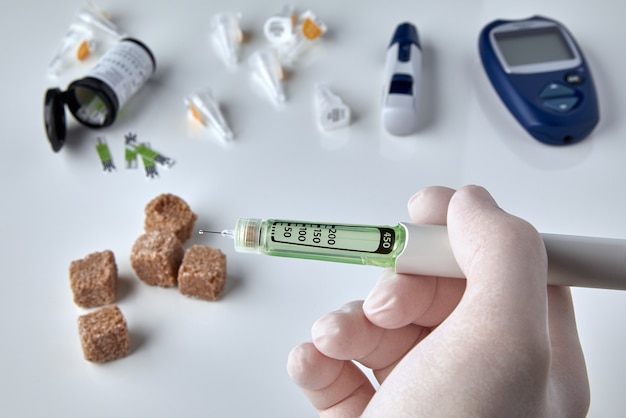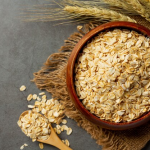The hormone insulin, produced by the pancreas, ensures that the sugar produced by the pancreas, which increases in the blood after feeding, is used in the cells and energy is produced. If there is more sugar in the blood than the cells need, insulin is also responsible for storing it as glycogen in the liver or muscles. Insulin resistance occurs when the hormone insulin does not fulfill its function in this respect sufficiently. If left untreated, insulin resistance can cause various health problems
Insulin Resistance
Insulin is a hormone responsible for the intracellular utilization of sugar from food A receptor acts to allow this hormone to take sugar into the cells For various reasons, this receptor is disrupted and the insulin hormone cannot fulfill its function even though sugar in the blood is increased. Sugar cannot be transported into the cells because the system is broken As the blood sugar level increases, the hormone insulin continues to be secreted from the pancreas Thus, the amount of insulin hormone increases in the blood In this way, a resistance to the hormone insulin develops This is called insulin resistance. In this case, the cells do not receive a healthy diet and cannot produce enough energy. This affects the whole body Therefore, insulin resistance can cause symptoms that affect the whole body These symptoms should be treated as soon as possible so that if blood sugar cannot be tolerated, it does not cause diabetes in the later stage.
What Causes Insulin Resistance
Insulin resistance is a condition that occurs when the body’s normal cycle is disrupted Insulin resistance can occur due to genetic predisposition if it is genetically present in a first-degree family member. However, many environmental factors can also cause insulin resistance In general, this condition can be caused by conditions such as obesity, belly fat Because when excess calories are taken, the fatty acids that increase in the blood cause the insulin hormone not to fulfill its function at full capacity. On the other hand, a diet rich in carbohydrates and a stagnant life away from physical activity can also cause insulin resistance. Liver disorders and diseases such as PCOS (Polycystic Ovary Syndrome) can also cause metabolic insulin resistance. At the same time, vitamin D deficiency can also cause insulin hormone resistance.
What High Insulin Resistance Means
High insulin resistance means a high insulin resistance value in scans and tests
Symptoms of Insulin Resistance
When a resistance to the hormone insulin occurs, many systems in the body are affected Therefore, these affected mechanisms may manifest themselves with different symptoms These symptoms can be listed as follows
- Increased desire to eat foods containing sugar
- Sleepiness after eating food or sugary foods
- Rapid weight gain
- Challenging weight loss
- Weakness, fatigue, lack of concentration
- Menstrual irregularity
- Fatty liver disease
If you have these symptoms, you should go to a health institution as soon as possible to measure insulin resistance
What is Insulin Resistance Test
A person with symptoms of insulin resistance should first visit a specialist doctor in the endocrinology department The specialist doctor can use several types of tests and screening methods to diagnose insulin resistance
- Fasting blood glucose test The limit value in fasting blood sugar is 100 mg/dL Above this value between 100-125 mg/dL can be considered prediabetes
- HbA1c test It is a test where the average blood sugar average of the last 2-3 months is given in general. The limit value is set at 5.7 Above this value, 5.7-6.4 is the pre-diabetes risk range. A value of 6.5 and above is considered as a diagnosis of diabetes.
- OGTT (Oral glucose tolerance test) It is a blood value measurement performed after approximately 1 hour by giving 50 mg of sugar solution to the person. The limit value of this measurement is 140 mg/dL Above this value, 140-199 mg/dL range is risky 200 mg/dL and above can be diagnosed as diabetes
The HOMA-IR value, which is the insulin resistance test, can be calculated by looking at these tests The HOMA-IR (Homeostatic Model Assessment) value gives the clearest information about insulin resistance This value is obtained by multiplying the fasting glucose value by fasting insulin and dividing this value by 405. With this formula, a value above 2.5 indicates the presence of insulin resistance
How to Treat Insulin Resistance
When insulin resistance is diagnosed, the specialist endocrinology doctor determines the most appropriate treatment method for the person Generally, changing lifestyle such as nutrition and physical activity is effective in the treatment of insulin resistance. However, in some cases, the doctor may also recommend medication It may vary according to the treatment protocols suitable for the person
What Should People With Insulin Resistance Pay Attention To
People with insulin resistance can reduce insulin resistance by improving their lifestyle These lifestyle changes can be listed as follows
- Healthy eating is a very important step in the treatment of insulin resistance They should prefer foods rich in fiber, vitamins and minerals with a low glycemic index that do not raise blood sugar rapidly.
- It should be consumed according to the nutrition plan determined by the nutritionist and healthy foods should not be overdone
- In the preparation of foods, instead of frying and roasting, oven and steam cooking methods should be preferred
- Packaged foods containing simple sugar and glucose syrup should not be consumed
- Consume healthy fats instead of foods containing trans fats
- Adopt an active lifestyle and engage in regular physical activity
- The fluid balance necessary for the body must be ensured
- If there is a weight status higher than ideal measurements, healthy weight loss methods should be used to reach ideal ranges.
- Good sleep is an important factor for the general health of the body, so attention should be paid to daily sleep time and sleep patterns.
- Smoking and alcohol should not be used
- Avoid stress and depression as excessive stress indirectly increases blood sugar levels in the body.
All these items are important steps in reducing insulin resistance and improving quality of life All of them should be evaluated as a whole and special attention should be paid during the treatment process
Frequently Asked Questions About Insulin Resistance
What Does Borderline Insulin Resistance Mean
Borderline insulin resistance can be defined as a fasting blood glucose level of 100-125 mg/dL; an HbA1c level between 5.6-6.4; an OGTT level of 140-199 mg/dL. These values are risky values for diabetes These risky values mean that insulin resistance is borderline
How Many Should Insulin Resistance Be
Insulin resistance should be 2.5 and below when calculated with the HOMA-IR value
What Should People with High Insulin Resistance Eat?
In case of high insulin resistance, diet is very important to reduce resistance In this respect, foods with a low glycemic index that do not raise blood sugar rapidly should be preferred Fruits and vegetables rich in fiber, vitamins and minerals, legumes, nuts, whole grain foods are among those recommended to be consumed in insulin resistance While consuming these foods, attention should be paid to portion control and should not be overdone.
The way of consuming the foods recommended to be consumed in insulin resistance is also important in the treatment process If there is a carbohydrate-containing food in the meal, it is recommended to add protein or a healthy fat group next to it For example, nuts or milk, yogurt group next to fruit; if bulgur pilaf is to be consumed, a protein source such as meat or chicken can be a good alternative.
What to Eat and What Not to Eat with Insulin Resistance
People with insulin resistance should basically avoid foods that raise blood sugar rapidly First of all, foods such as white sugar and confectionery containing white sugar, desserts, cakes, cookies should not be consumed At the same time, white flour and foods made from this flour should not be preferred Among fruits, figs, grapes, melons, watermelon raise blood sugar levels rapidly and should be consumed with caution. In addition, foods such as rice and potatoes are not recommended for people with insulin resistance.
Insulin resistance is a condition in which blood sugar cannot be taken into cells properly due to improper nutrition and lifestyle. In this case, problems caused by resistance can be eliminated with lifestyle changes or medication when necessary to reduce resistance.
= =Page content is for informational purposes only Please consult your doctor for diagnosis and treatment.









